#its literally keeping me up at night. was shadow ever on the ark before. was he really made on earth by gerald to enact his revenge
Text
its making me ill

#sth#sa2#sa2 iso#sonic#shadow#footage and translations by Windii#context: this is about the isolated sa2 narrative (so ignoring anything that was established or changed after 2001)#its literally keeping me up at night. was shadow ever on the ark before. was he really made on earth by gerald to enact his revenge#were those memories ever his own or... 💥#sonic is the ultimate lifeform but in what way exactly? WHO is sonic?? we'll never fucking know#and him saying adios in the exact same way maria did messes with me so much. is it just a parallel or was it meant to imply more#help! LOL#tapes#text
23 notes
·
View notes
Text
Yugioh S2 Ep 43: Things Get a Lot Less Vague, But it’s Still Pretty Vague
I’m taking full advantage of the laziest time of the year and I’m watching even more Yugioh. I even gave myself a buffer. Sort of. I kinda lost a day playing Octopath Traveler and I don’t even remember that happening.
Now this episode doesn’t have anyone getting struck by lightning, but if that happened, it would have fit right in. A lot happened in this episode. So, to start off, Mai decided to play one of the three cards we were given explicit instructions to never ever play and it has immediately screwed her over via orb.
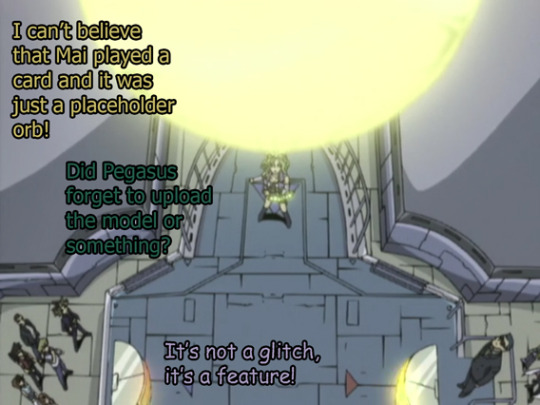
Everyone else watching the orb has become completely enamored by it. Especially Kaiba, who is pretty positive he can turn this sphere into a dragon. I don’t know why anyone would ever come to this conclusion, but welcome to Yugioh, it’s well into S2 and I’m just still jaw agape and saying “HOW?” at my screen.
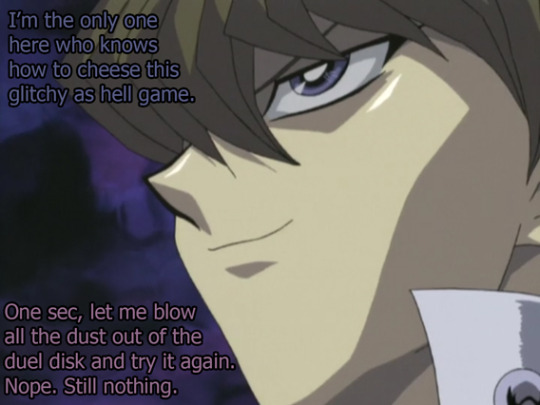
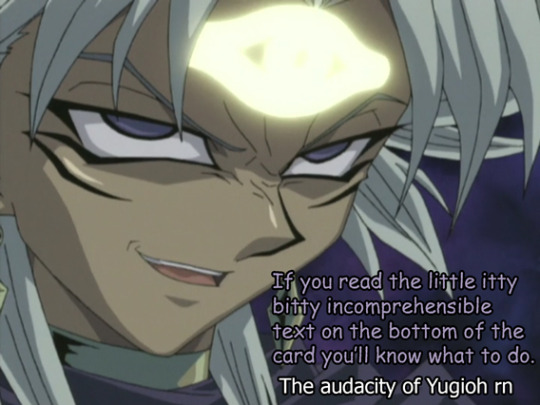
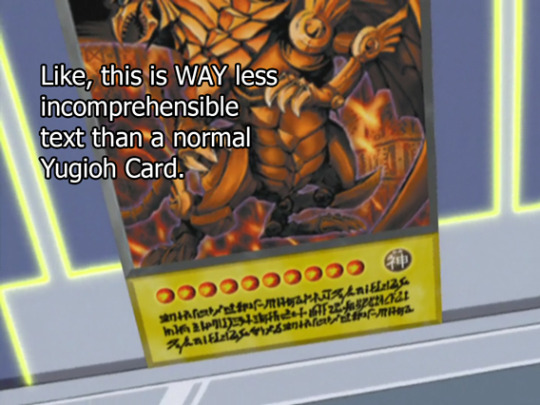
Like y’all I don’t know how to play this game, which should be hella apparent from reading any of my posts, but like there is one thing that everyone knows--even I knew--about Yugioh the game. Let me just, once sec

Ah, there we go.
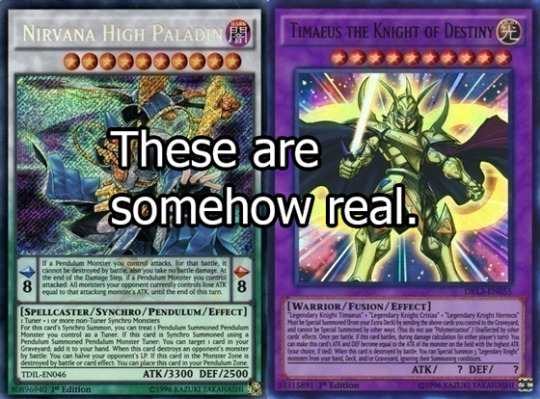
Like sometimes it shows that your game is originally in a language that doesn’t require spaces between words. And like this is coming from me. You know how verbose I am, I freakin love words. But maybe that’s too many words for a card.
(read more under the cut)
And while this is pretty much the worlds most BS card already, what’s even better is that none of this jargon appeared until after Mai played the card. Like basically the card pretends to be completely normal and then is like “Boom, gotcha. I’ll just be a cool Ikea orb lamp instead!”
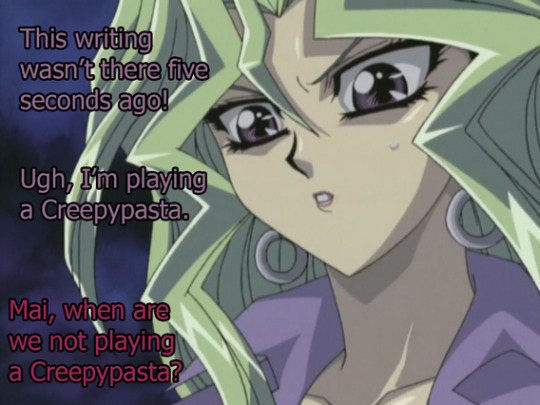
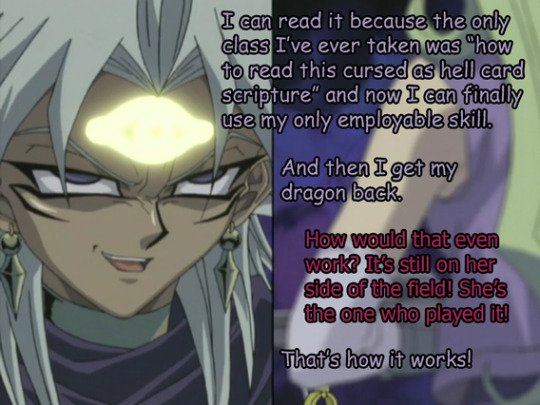
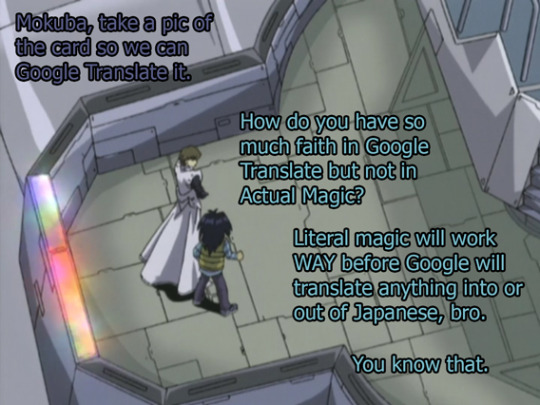
At this point, while everyone is scrambling around trying to fathom what to do about this huge ass fake sun blinding everyone down in Domino, Marik decides to deposit some more bizarre lore.
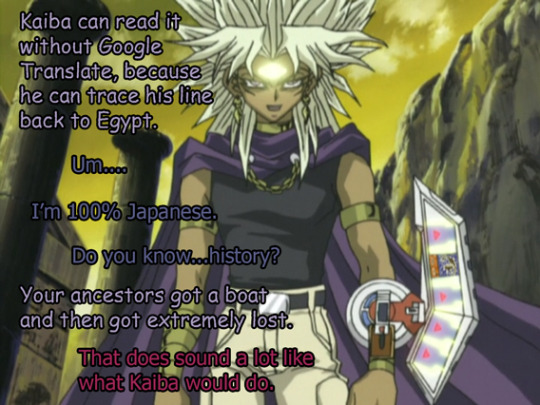
I kind of assumed Yugi and Kaiba were born with the correct soul formula to become the reincarnation of these people from 3000 B.C.E. without any actual blood relations but apparently, somehow, you got people from Ancient Egypt migrating to Ancient Japan. Sure, I mean if you did enough trading routes it could happen. It just seems like it would be a difficult transition?
And we could get real head canon and talk about their parentage since there’s a lot we don’t know. Mokuba and Kaiba could have different fathers, since they are quite different looking, which may be how Mokuba is exempt from all this lore while it still applies to Seto (Cuz Mokuba has been staring at that card for like quite a while and he cannot read it). But like, I don’t know if the show will even bother to cover that.
I don’t know if we’ll find out when in their bloodlines Kaiba and Yugi’s Egyptian cursed lines arrived in Japan. Was this during like the Edo period? Was this to set up a really bizarre Shogun Yugioh spinoff?
Wait, is that a thing? I don’t actually know, Yugioh seems to have like 8 spinoffs that all look a lot of the same to me. It may just be 1 spinoff that Netflix keeps changing the preview image of to trick me into thinking there’s 8 of them.
Or, did Kaiba have a relative that showed up in the 80′s and had a crazy weekend and a one night stand? Would Kaiba even know who his real Dad is?
Whatever, I’m sure there’s plenty of fanfic made over the last 20 years to cover this so I don’t have to. Moving on.
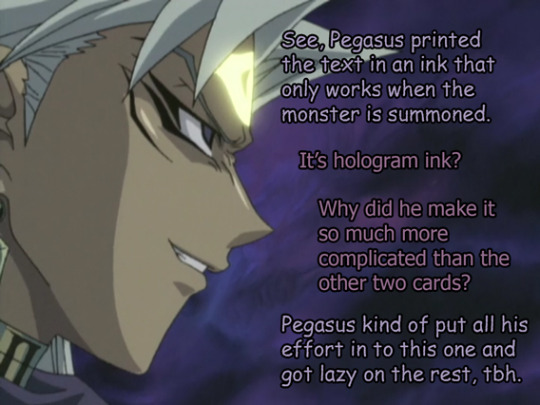
And then this kid’s show decided to tie up Mai to a wall or something? Man, Marik and chaining people up, this is the fourth person he’s chained up today! At least this time she doesn’t have a box over her head.
Still pretty kinky though.
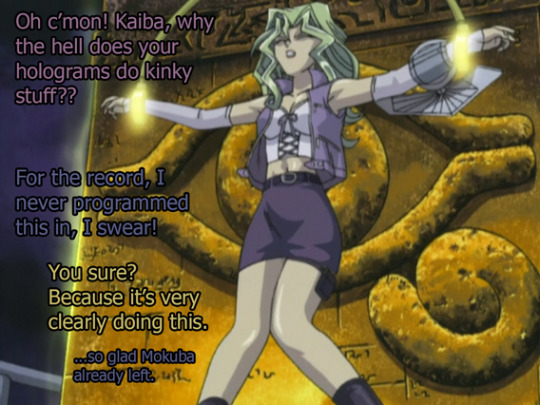
Yo did Mokuba just...casually walk out of Marik’s Shadow Realm just now?
Again, do they cancel the game at this point because the equipment is...clearly malfunctioning? Like, this is the part that Kaiba is supposed to have full control of because he made all the equipment they’re using and he’s just...glossing over this? Like, this is the one thing that Kaiba would be like “OK wait, wait, we can’t ship it like this, my company is actually ruined if the game can do this, one sec, cancel everything.”
Nah. They just kinda watch.
And now, Marik decides to say the bird chant so we can hear what was actually written on the card and it was...a...
...it was the definition of what a poem is all right...
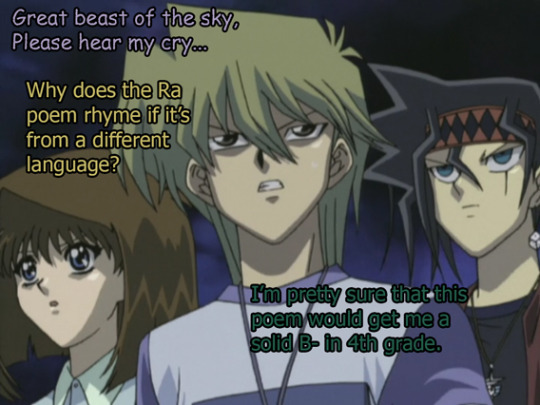
This is the lyrics to the Ra poem, just so you can see how bad it is. My search engine history will never be the same, but I just want y’all to glory on how kid’s show this poem is, compared to everything else going on in this kid’s show at this moment.
"Great beast of the sky, please hear my cry./
Transform thyself from orb of light and bring me victory in this fight/
Envelop the desert with your glow and cast your rage upon my foe./
Unlock your powers deep within so that together we may win./
Appear in this Shadow Game as I call your name,/
Winged Dragon of Ra"
Bravo, writers. Bravo. This corny as hell poem with its very awkward meter was voiced over alllllll the other nuts stuff going on in this show and guys, it’s a juxtaposition.
Now at this point, Kaiba has his poem he needs to make the card works--so he no longer needs to translate it--so he can just cancel. He’s got everything he wants now. Time to just cancel. Throw the cursed boy in whatever prison you got on this ship. In fact, just toss him off the ship entirely. You no longer need him. He doesn’t even have the card anymore. Mai has it.
I honestly think Kaiba just spaced the hell out at this point.
Also then Marik follows it up by saying this:
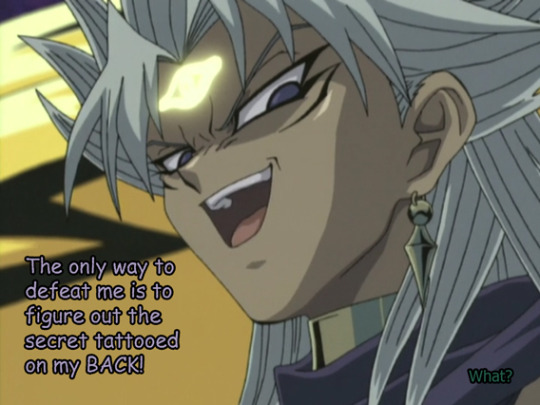
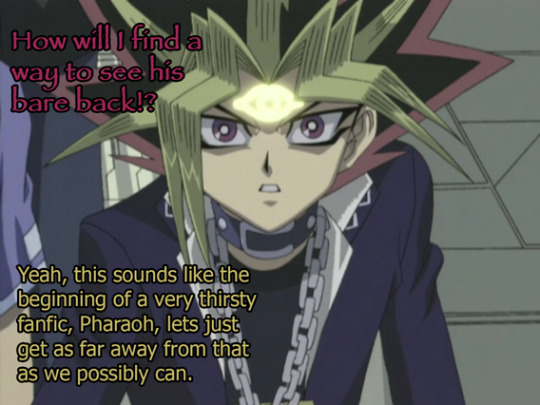
Joey gets wind that this is pretty bad and we’re going to get a very dead Mai--I mean Joey was the one who just recently got struck by lightning so it’d make sense that he’d be the one to say "I know for a real true fact none of you are going to do a damn thing about this unless I do this myself.” So he runs directly over to Kaiba but then I think the show decided to edit out him talking to Kaiba because it just jump cuts to Joey talking to Roland instead.
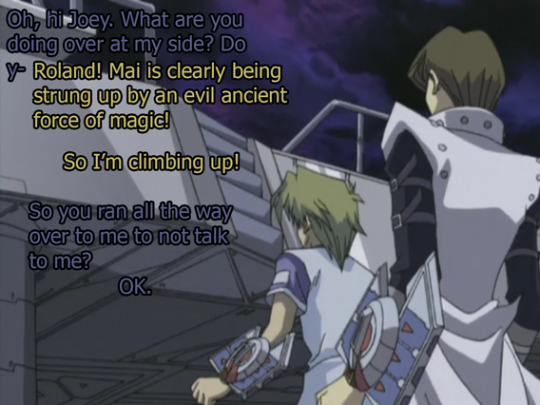
Like it really felt like Joey went the long way around to get on this platform but I dunno, maybe he tried to punch Kaiba in the Japanese version and that’s why they edited it out? I dunno.
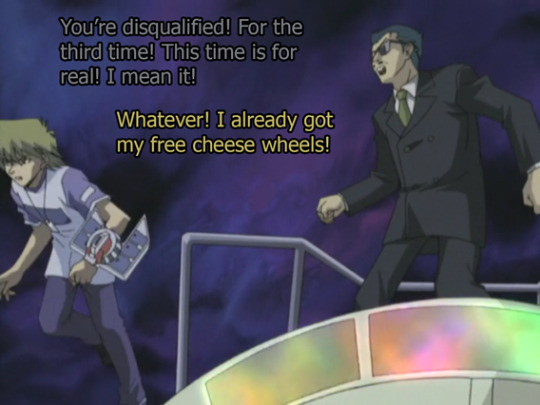
Also, how many times will Joey get DQ’d before he actually gets DQ’d? Will anyone ever in fact get DQ’d in this entire tourney?
As Ra starts warming up his engines to start spewing fire all over the field, Joey decides to take a moment to try and talk to Mai. To tell her that yes, he did have a dream about her, but didn’t want to tell her earlier, because no teenage boy in their right mind would tell an adult woman that they had a dream about them during a near-death experience.
Which honestly most of it was lost on the fact that Mai can only hear him as a sort of ghostly spooky echo.
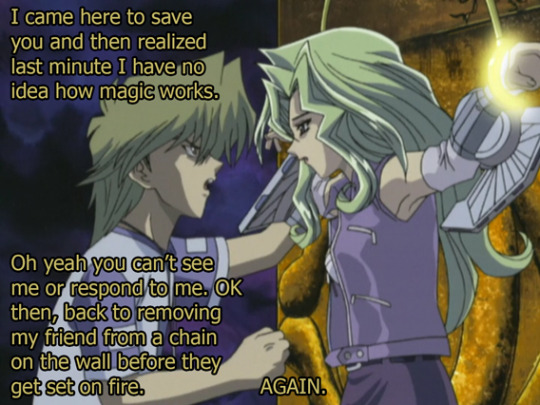
So then, through the power of...the show only calls if friendship, but it’s very vague, y’all...they break the curse that Marik put on Mai, and she remembers Joey. Also because Joey is touching her face. Like literally touching her. This would have been way spookier if she could not see him at this point.
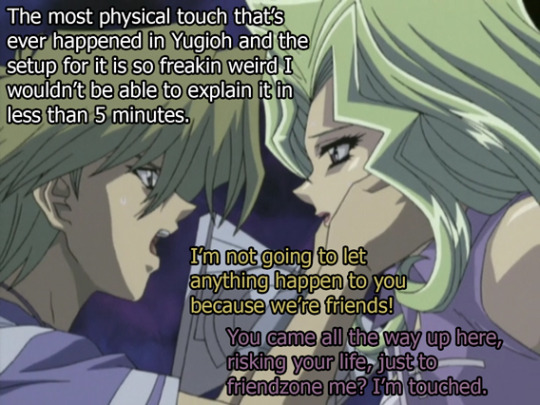
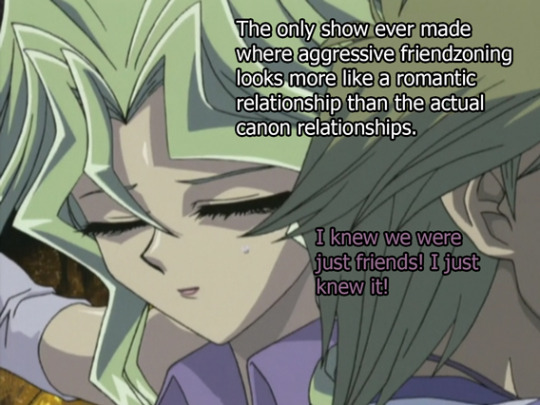
So Ra is getting ready to fry these two up and I thought “wow, we’re gonna get two bodies at the end of this episode. What a treat!” but there’s a twist.
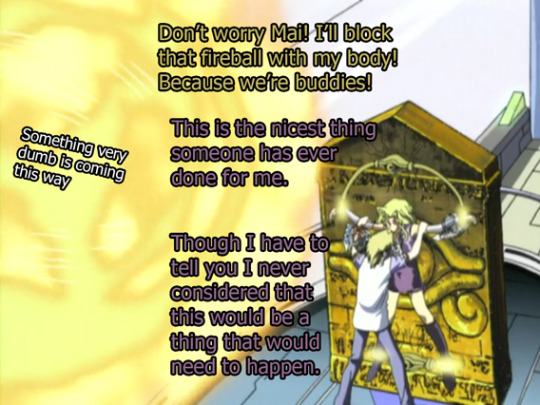
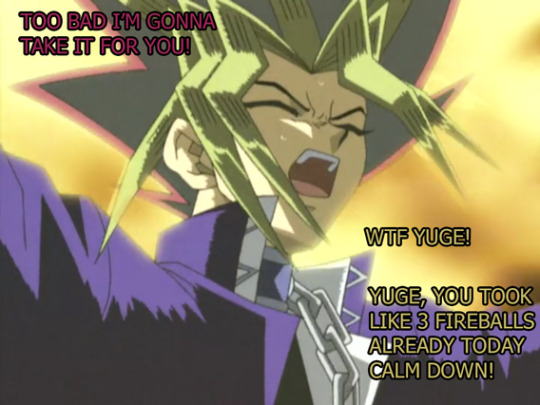
What? Lol what?
Within like 3 milliseconds, Yugi goes “dammit what are these assholes doing?” and leaps up to the platform and then takes yet another direct fireball hit in order to save Joey Wheeler. No one even asked Yugi to do this--he’s not even competing in this game, but he certainly got up there and took it.
This episode must have been a right up shipping frenzy when y’all were 12.
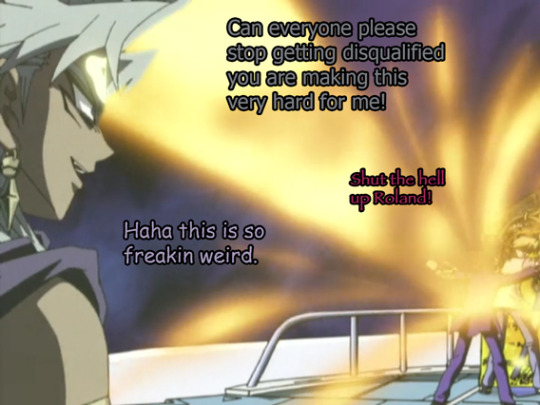
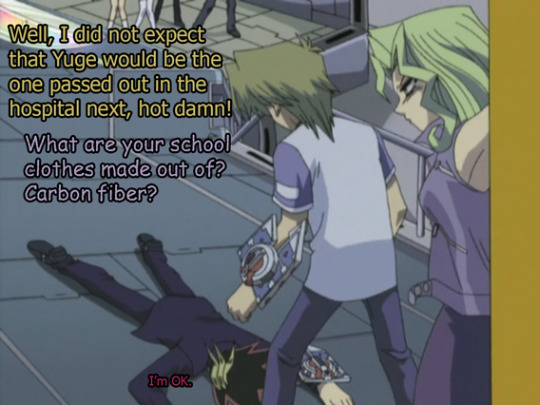
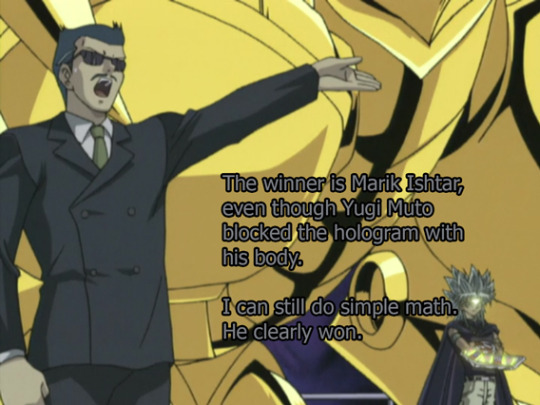
Marik is so pleased that he got to eff up Yugi more in this duel than the one that he actually tried to kill Yugi Muto in. If I remember correctly he did mention that this all was very convenient--I mean he got 3 in one go and he wasn’t even trying. So, Because Yugi is passed out and because Kaiba will never actually step in and stop anyone in this show unless Mokuba orders him to, Marik walks straight up to Joey and Mai and makes some more nonsense right in front of everyone on this show.
This is right in front of most of the entire cast.
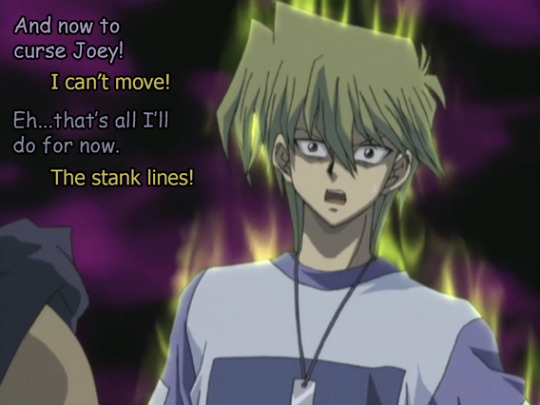
Maybe it’s the color scheme but I got strong Stinky Cheese Man vibes from this magic effect.
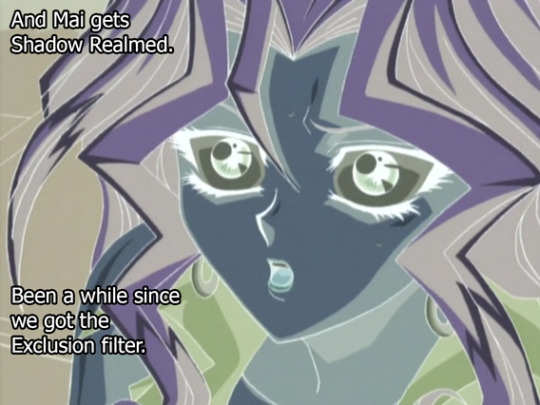
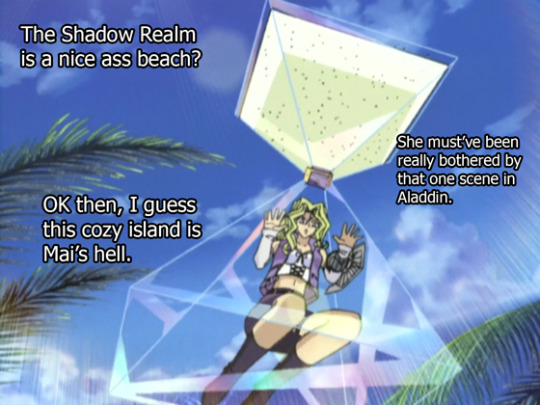

I thought of pulling more caps from this point but there was waaaay too much shirtless Yugi in it. In my mind, all cartoon characters, when they take their shirt off, have another shirt on underneath. And if they take off that shirt, it’s yet another shirt. It’s shirts and boots leggings on all the way down to infinity like a russian nesting doll, and the image of shirtless Yugi really puts a kibosh to my world view and I didn’t like it.
No kinkshame, of course, if that’s your thing, well, you got a 18x18 pixel shirtless Yugi right there for you to enjoy. Enjoy.
Now that Mai has been trapped here in this hourglass resort, she will lose her memories of her friends for the rest of time, obsessively watching everyone else's vacations that are full of friends having way more fun than she is having.
This is just Instagram basically. Y’all, this is just Instagram.
And some of y’alls Instagram has shirtless Yugis in it, I just know it.
And not to get too real but like, last episode we went through how Marik basically gave Mai depression--and it says a lot that his way of doing this was illustrated in a show written like 20 years ago in a lot of the same way social media works today. Just throwing that out there.
Overall, I feel like the theme of the Mai ark is “Marik just sped up what they were already doing and it was super effective.” Mai trapped herself in her own false and negative insecurities. Kaiba failed to moderate anything. Joey waited way too late to say the right thing. Yugi sacrificed himself again to such a degree that he couldn’t save Mai later when Marik was just strutting around cursing people willy nilly.
And I’m not going to lie, Marik’s cargo pants/cape strut was hilarious.
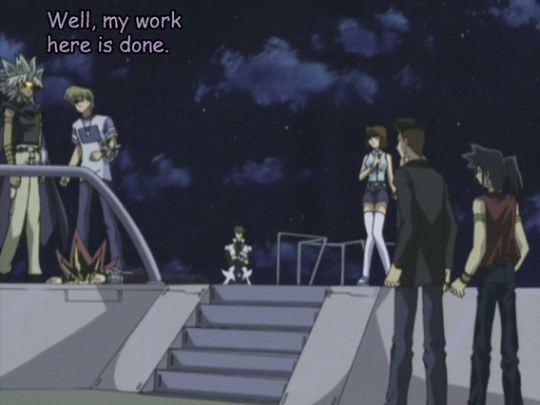
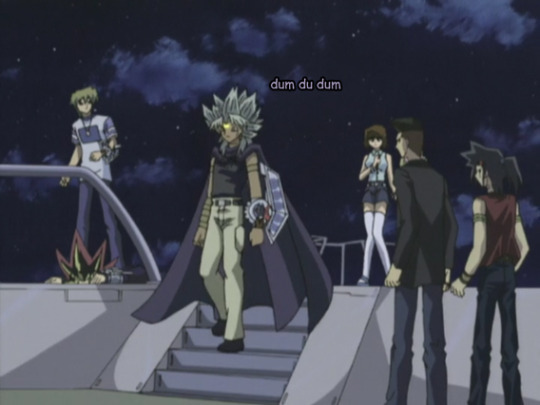
It was probably supposed to be menacing, but this long cut of this ridiculous cast just watching this weird boy go was great.

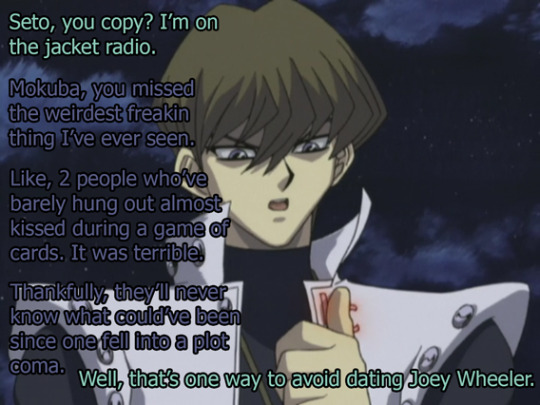
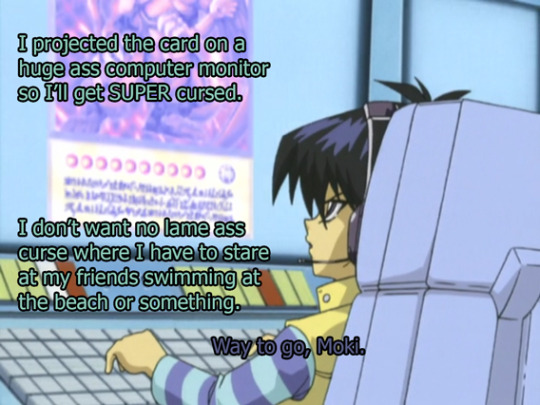
Up until now Seto has been a very patient impatient person, but now it’s finally his duel, and he’s so excited to duel Ishizu--but y’all it’s just Seto up against a phsycic again. I imagine it’s gonna go real great.
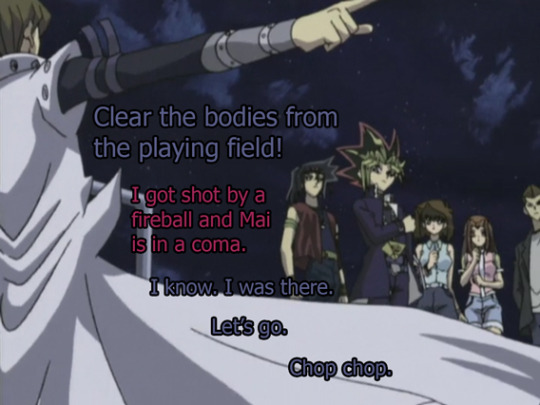
Other than that one guy in town, will this boy ever duel a normal person?
Also...been debating on whether Mai is dead or alive, and her soul still seems attached to her body--like she’s still salvageable? So I’ll say alive for now. Seems more like a dream than like she literally got transported elsewhere.
Dude. It is S2 and I just realized that Mai Valentine is a pun.
Damn.
If you just got here, this is the end of S2 and things are rapidly losing their mind. Click here if you want to read from ep 1
#yugioh#yugioh recap#photo recap#s2 ep43#So like this season is almost over and nothing is getting resolved?#joey wheeler#mai valentine#yugi muto#seto kaiba#marik ishtar#How many times in one day can yugi Muto get hit with a fireball#Do not understand how this boy isn't in smash yet#mokuba#tea gardner#tristan taylor#I guess duke devlin was also here in the background
43 notes
·
View notes
Photo

Latest story from https://movietvtechgeeks.com/top-5-supernatural-episodes-might-surprise-spnfamily/
Top 5 'Supernatural' episodes that might surprise SPNFamily
Socially, we’re conditioned to ask the basics when we meet people. You know, the small talk questions: Where are you from? What do you do? How many siblings do you have? Eventually, we progress into the hard-hitting ‘getting to know yous’ of relationships, even if it’s reading someone’s words. Favorite song? Favorite book? Favorite movie? The thing is, people sometimes lie. Whether they mean to or not. No one’s favorite book is Anna Karenina; it’s just not. You can respect the book, but it’s not your favorite; you don’t revisit it regularly, it’s not a comforting blanket you burrito yourself inside. For example, my favorite song, book, and movie, respectively, are: “Just What I Needed” by The Cars, “Death Comes as the End” by Agatha Christie, and “A Few Good Men.” Have I heard better songs? Sure, as one of my best friend’s husband once said: “‘Just What I Needed’ isn’t even Ric Ocasek’s favorite song.” Have I read better books? Absolutely. Are there better movies? No. And I will fight you. My point is: sometimes I think that society, or in this case fandom culture, makes us feel as though we should choose things that we may like a lot but also simultaneously live up to some arbitrary social standard or norm, as our favorite. In Supernatural fandom I often see the same few episodes held up as universal fan favorites; episodes like “Yellow Fever,” “Changing Channels,” “The French Mistake,” “Swan Song,” and “Baby.” Maybe these episodes are your faves, but they aren’t mine; not even close. I’m not even talking about the episodes I think are the all-around best or the most quintessential (we’ll get into that in another article). I mean these don’t even make my top ten, they aren’t my go-to episodes, the ones I’ve watched the most, the ones I’ll watch out of sequence just because I want to relive the entire thing on a random Tuesday afternoon. In fact, one of those example episodes is in my bottom ten. So, which out of over 265 episodes, are my favorites? I’ll tell you not because I’m telling you that I think these are the best episodes and that you should agree (again, that arrogance will come in another article), but because I think this is a fun introduction. A way for you all to get to know me. Sin City - I’ll admit that “Sin City” isn’t the best episode ever penned, the quips are heavy-handed, and the plot is simplistic. Honestly, it’s kinda middle of the road, but that’s what makes it re-watchable without the emotional hangover of “Mystery Spot” or “Fresh Blood” (Besides, we’ll get into those episodes in a later article. What “Sin City” does have is a great supporting cast: we get to see Katie Cassidy finally start to her get bearings playing Ruby 1.0, we get a great scene at the beginning where Sam and Dean are such bratty, yet lovable surrogate children to Bobby, we meet and mourn Richie, the perv with a heart of gold, (I mean, he’s basically Dean (Jensen Ackles) without the suave or skill), and we cozy up in a basement with Casey the bartender demon who is insightful, witty, and deadly, but her quid pro quo with Dean gives us a good dose of classic cocky Dean Winchester who is also a scared little boy underneath it all. Bonus, we also get the rare unicorn that is goofy, chagrinned Sammy as he backs his way out of Trotter’s office. And anyway, if you don’t catch yourself saying “I make a mean hurricane” every time you look at the Red Lobster drink menu you are living your life wrong. Ask Jeeves - now, I’m going to stop you before you tell me that Fan Fiction is the best episode of season 10, because it’s really, REALLY not. It’s arguably in the bottom three of the season. “Ask Jeeves,” however, was a perfect play on the movie that inspired it (which is one of the best movies of all time, again, I will fight you) and was another episode overflowing with a great supporting cast with fantastic comedic timing. For an episode that was primarily a loose tie-in to the release of the Supernatural Clue game it could have gone so wrong, but instead, it went so very right. The soundtrack is stellar, the jokes and pop culture references are on point without being concussion-inducing anvils, and the mystery itself is background to the story without being disappointing. “Ask Jeeves” is a comedic romp with a nice little hit of Winchester family feelings; it’s a bread and butter Supernatural episode. Besides, Dash hunts pheasants. He. Hunts. Pheasants. Caged Heat - This is an ensemble style episode done right. We get one of the best interactions between Sam/Dean and a demon to ever grace the show (props to character actor Conrad Coates for delivering, “I know you're speaking, I see your lips moving, but I can't understand what you're saying 'cause I don't speak little bitch,” because that line is a mouthful) and from that we slide seamlessly into Meg getting the drop on the boys and Sam turning it on her in the blink of an eye because he now understands her calculating nature so well. Speaking of calculating, Sam using the the plot of Raiders of the Lost Ark to lure Castiel to him is a perfect segue into their mutually soulless tête-à-tête (full disclosure, season 6 Castiel is my favorite version of Castiel). We also get Meg taking on a pack of hellhounds, Dean threatening Samuel, Sam (Jared Padalecki) biting into his wrist to draw a Devil’s Trap with his own blood (that bloody grin is everything), Dean rescuing Meg from demon Christian. Then we get the brothers and Meg working in tandem against Crowley in perfect harmony, the fake-out Crowley death that we only later find out was all a set up between Crowley and Castiel (Misha Collins) who were working together all along. It’s an episode that works on your first watch, yet is even more brilliant in retrospect. Night Shifter - Okay, I’ll be up front, season 2 is not only my favorite season of Supernatural but one of my favorite seasons of television. Period. Even its weakest episode is still so damn good, but if I have to choose one to go on a list that is based on simple re-watchability, I have to hand it to this one. Meet conspiracy theorist Ronald Resnik; he’s that character that every procedural or genre show needs at least once a season; the one who is wholly unqualified, but still tries to be the hero. Not for the glory, but because lives are at stake and the right thing has to be done. We laugh at Ron and his mandroid ideas; Dean praises him, Sam shuts him down, both do it because he’s so close yet, oh, so far from the truth. And when Ronald gets shot (which while tragic, is gorgeously directed and edited) your heart breaks for both Dean and Ronald. You also get exactly that Sam wanted to keep him deep in the dark because the hunter life is nothing but pain and death. Speaking of impactful characters, we also meet Agent Henriksen in this episode, a character that is a perfect example of an outside POV of the Winchesters. His description of them being “dangerous, smart, and expertly trained” is so important because he doesn’t know what they really do, yet he understands who they are on a fundamental level, and while he wants to lock them up, he fully respects them as adversaries. This episode is cinematic; it literally feels like a complete movie. It’s beautifully shot, every actor brought their A-game (Dean’s little forehead punch when he hangs up with Henriksen is one of those tiny, silent details that makes a moment a moment). We get great dialogue (“I like him, he says okeydokey,” “its robot skin is so lifelike;’ Sam’s long-suffering “we’re not working for the mandroid!;’ Henriksen’s breakdown of the Winchester family that could have been clunky exposition but was instead just a smooth reminder of who they are with bonus (“yeah, I know about Sam, the Bonnie to your Clyde”). But if all that wasn’t enough, there’s also arguably the most iconic Supernatural moment and one of the top three musical cues of the show: Sam and Dean in stolen SWAT gear sneaking to the Impala while “Renegade” plays. I’ve seen this episode more times than I’m willing to admit, and I get chills at that moment every single time. Shadow - Yeah, I know, this is out of left field, but hear me out, because I think this episode is woefully underrated. First of all, we get a tiny peek into the Weechesters by way of Dean reminding Sam of his high school drama years. Not only did Dean remember Sam was in “Our Town,” he clearly went to the play to support his baby brother. We also get smart Sam AND Dean in this episode. Dean by way of visualizing the Daeva pattern in the victim’s blood and Sam using the flare against the Daeva shadow demons. Speaking of the brothers being brothers, there’s a lot to take in during this episode. Starting with them running into Meg and Dean being hurt by Sam telling her about their fight, but as soon as Sam reassures him that he’s with Dean by choice, not force, Dean slips right into teasing, wingman big bro mode. Add to that the subtle nod of trust we can infer by way of Sam taking Baby for his stakeout while Dean researches. This is an episode that on the surface is a basic hunt that ties into the now growing cohesive season throughline, but it’s actually all about family. There’s the brothers’ dynamic and the way their bond has solidified since “Scarecrow”, however, we also get to see Dean’s vulnerability when Sam naively thinks that this could be it, the end of it all, the catalyst back to “normal”, whereas Dean just wants his family together, hell or high water. There’s also the fact that no matter how you as a viewer personally feel about John Winchester, the demons know that he’s never far behind his boys; he’s always watching, always protecting them in his own way. And, of course, we get to see a full Winchester reunion complete with damp eyes, manly hugs and choked up voices. John Winchester saying, “hey boys”, the brothers saying “yes, sir” at the same time (this episode has two instances of Winsync Winspeak); John’s unspoken apologies; Dean’s face while Sam and John hug; Sam being the one who wants them all together, and Dean being the one to understand that they can’t stay with John. John mirroring Sam’s earlier words to Dean about letting go. All of this will always make me emotional. This episode also has one of my favorite horror tropes, one that Supernatural has unfortunately pulled away from in recent years: it’s creepier when you don’t see what’s after you, like the great Steven Spielberg once said about “Jaws,” what’s scariest is the “fear of the unknown.” The mechanical shark forced Spielberg’s hand, and a crazy tight budget forced Eric Kripke’s, but it worked; the shark is terrifying because you don’t see it until the end, it’s the anticipation. It’s the same with the Daeva being shadow demons and later in seasons 2 and 3 with the hellhounds. Unfortunately, in recent seasons we’ve now seen hellhounds, and, well, they were scarier when all we had were torsos shredded by invisible claws and our imaginations. And as much as this episode was packed to the brim with Winchester family fat to chew on, they aren’t the only family. We find out that Meg is doing what she does for family as well. The overarching theme of Supernatural takes form in this episode; human, demon, ghost, or ghoul, it’s always about family in some way. [caption id="attachment_52142" align="aligncenter" width="696"] Source: Home of the Nutty screencaps for all images[/caption] So, like I said when we started this, my intention isn’t to say these are the best episodes of Supernatural, merely that these are my top 5 comfortable sweatpants episodes. So, did any of your favorites make my list? Did I make you want to re-watch an episode you don’t think much about as much? Let me know.
Movie TV Tech Geeks News
1 note
·
View note
Text
The Sound of Black Voices, The Sound of My Father
I.
Who Will Build this Ark of Bones ?
Once upon a time I had a house full of cousins, convivial aunties, resounding uncles with gold belt-buckles and big happy teeth, a black grandmother who washed my hair in the sink and taught my mom how to cook greens so tender and comb through my coils. On Sundays we’d all be at the local Baptist church, the whole choir was blood, I would clap and spin and scoot up to the stage in a rile of girlhood and pride, dad would be leading everybody, being the commanding, larger-than-life, chief-of-a-loving tyrant that he could be, for the good times. Nothing mattered but the tone when he got to singing—no one should question the authority of a voice like that, the fear that it would go silent was enough to convince us to endure every scream.
One by one those bodies visiting our house turned into ghosts, figments of my imagination. Day by day our routine was slipping into disaster’s taunting shadow and it seemed everybody was waiting for dad to fulfill a prophecy and enter the afterlife, sing to us from the other side. When he did, his haunting compliance so well-timed it’s my eternal fable for unconventional acts of deep generosity, my mom and I were out in California having left the paradise of phantoms I called home for a safer environment, a less complicated dream. By the time we got word, our Iowa fairytale had turned into a Reparations graveyard.
Maybe they weren’t legal heirs to the rights to his songs but my grandmother, aunts, uncles, cousins, deserved something—a gold record, a Stetson or fringed suede and denim jacket, one of his many guns packed in a suitcase like grams—that announced Jimmy was here, was ours. By the time it was my mom’s turn to look through the remaining belongings all that was left was her stuffed childhood monkey, Zip, some pictures and letters he’d written me and her in his broken penmanship, and a shoebox full of tapes he’d been keeping under their circular bed, recordings of his latest music.
Enough for a new beginning.
After all, his voice remained immortal, black with grief and guile, sweet and childlike, chills down the spine, gritty and remote, knowing when it’s time to tremble and when to be still in the low of limbo.
II.
Can’t You Hear It?
Listening, knowing one another by sound and voice, is the first law of black liberation—without this skill there is no self-preservation. From differentiating between urgent aggression and routine to separating moments of life-threatening anguish on a slaveship from the casual agony of another day in the hold, from deciphering the outcome of a session on the auction block through the cadence of those in attendance bidding in, to listening for the music of keys and shoes and rippling bills of sale and commands, all while still in disbelief at having become human contraband.
Next came the soul-threatening business of navigating life and forced labor on plantations, using the well-tuned ear of black survival to decode a symphony of footsteps, whips, Bible verses, moans, hisses, work chants, screams, hooflandings, rainfall, collapse, talking drum rising from the tap-rooted foot to the shamed skull, all of it echoing in the trapped and huddled sound of the English syllabics mangling in the planters’ mouths, acting as one of many indications that violently broken logic was the fulcrum of the West and would be used to keep black bodies in captivity in one form or another, for as long as circumstance or the bodies themselves would abide. And if we listened closely enough to that cacophony, we could detect within it the performance of hatred and domination used to mask the violent, obsessive, almost fanatical love American whites harbor for black bodies, black people, and everything we produce—how they tend to often covet and resent all otherness for the trance of envy or awe it strikes in them. We who hear this grand hypocrisy with our whole bodies are the first fugitives from it, running and not in fear.
“That box of tapes my dad left opened up a life of listening to the recorded voices of black people, developing almost pathological kinship with resonant timbres.”
We had to learn to listen through the wall of their deflected self-loathing on the road to turning their heroes and healers—us—into capital, before we could even hear ourselves think. We had to improvise small acts of subversion and freedom using our sensory attention and then project that provisional understanding of where we had been taken and why onto our own musical and spoken and mimed forms as we invented songs and styles of movement to relay the stories our hushed listening helped us gather and remember and invent. Our music became a form of collective listening and we used it to deliver dire messages as well as just to cope and retreat into beauty in otherwise-wretched places.
Learning to read could get us killed on plantations, but a literacy in rhythm and tone so acute we could communicate several very different intentions in one five-word arpeggiated blues phrase, was lost on those too literal, too evil to hear truths they didn’t comprehend: watchmen and slavers. And anything they could not ruin upfront became our grail, our pastime paradise, salvation. The improvisational musics we invented under those hyper-traumatic circumstances—deep listening projected outward, become mirrors to our jailers, deleting their obscene vanities, exposing them to themselves by inventing pure sonic opposition.
III.
Alone Together
My own listening practice began early and as a matter of survival and generational reckoning, because I was born into a household brimming with music and conflict, to parents who were either up all night singing and testing chords on the piano, or up all night fighting, with little in between. Everyone was acting funny, all the adults around me were a little lost and crazy—so not only was I both spy and informant for both sides, I was ruthlessly neutral; no one seemed like a victim and at the same time everyone did, and l listened closely.
Before I was three, I’d learned to listen for quarreling between my parents and decipher its severity. I knew how to listen to figure out if dad was sleeping and if so, with or without the phone off the hook. I could tell by the energy in his voice what kind of mood he was in, manic or brooding, and I could tell if mom was hysterical by the pitch of her moments of catatonia. I had to listen to my own breathing or lack thereof to block them out, the acoustics of survival that traveled in my DNA were needed in my household, where the race and gender problems played themselves out in microcosm and became inverted: the black man was in charge here and also petrified of the creative power that guided his rule; the white woman was his willful slave and not meant to get away. I was the evidence of what they could not otherwise say, that life begets life and it’s okay.
I listened in my sleep, my subconscious a vigilante. I’m not exaggerating. I developed a kind of clairaudience that helped me remain one step ahead of the misguided adults around me, I could feel them unraveling acoustically before they knew a new shambles was closing in on them, and I could dazzle them with my innocence just enough to remind everyone who the child was, who was responsible for whom (though I also learned that it’s a blurry equation, responsibility, everyone is everyone’s burden). I had to be responsible for my own psychic protection and it made me feel close to my ancestors—before I even knew their story, I felt it, was guided by events I had not lived in this lifetime, and the guidance came in the form of sound awareness, a kind of keeness no one taught me, born of necessity. Listening offered the distance and dimension I needed to endure, it’s how I drew a boundary around my body in that chaotic space, how I came to be a form, why I am a destiny.
IV.
The Man’s Gone Now
There’s an undeniable connection between close listening and absence, a sense that something is missing or has been stolen from us and might be tiptoeing toward us in the night from an unnameable erotic distance, pursuing triumphant reunion. This quiet almost anti-social optimism needs a place to play hide and seek with fate and the song and the sound offer an idyllic landscape. For this reason we rarely broadcast (to the limited radio imagination) our deepest acoustic preoccupations, and the diasporic music that collective listening generates is not always guarded by anything besides generational memory.
In the West the only thing more jarring than being free-spirited enough to make something up as you go along and enjoy it, is the confidence to not spy on yourself while doing it, to not maintain a record of exactly what happened, to not write it down or find some other form in which to engrave every nuance of every event into a lifeless monument.
In Black culture the record is the memory and the memory is the body, so the record is the body, and when it changes form, the spirit, the soul, the feeling and stories and teachings are passed down body to body like trusts without much fear that they will be lost. Even now, as we are lost, we’re not always inclined to create static archives that might lead us back someplace that makes sense. Our archives have always been alive, entities, capricious and at risk and traveling with us and guarding our sense of meaning, the sonic territory we can draw from no matter where we happen to find ourselves, this way nothing ever really goes missing, there is no myth that cannot be repopulated and reborn in any moment. Though spiritually this makes us versatile giants, economically in America it means we don’t always possess the mixture of opportunism and self-esteem that inspires us to keep track of our sh*t in a culture that uses formal recordkeeping as another excuse for the distribution of capital and real estate.
“Listening, knowing one another by sound and voice, is the first law of black liberation—without this skill there is no self-preservation.”
At the same time I realized that the distribution of land and resources in the US was often manipulated by large institutions that invest a lot of money into buying archives, creating exclusive portals through which documented history can be accessed and studied and changed, I saw that my family’s ransacked home and all of the missing parts of my father’s legacy revealed more than just circumstance. With all of that information scattered among estranged family members, a man’s story becomes compartmentalized, eventually forgotten, unless someone does the work of telling it, recording it, gathering it all back in one place, as sound, as verbal action, as music’s own memory, as more music, as better listening.
For black people of the diaspora, that place is often on a vinyl record, because the truth for us remains in the sound. That box of tapes my dad left opened up a life of listening to the recorded voices of black people, developing almost pathological kinship with resonant timbres, and a feeling of brotherhood, sisterhood, toward people I had only heard on a record or tape.
Eventually, after years and years of that practice, I started making my own archives, assembling recordings of black voices in ways that defy typical archival logic simply because the data collecting is improvised and at the mercy of in-the-moment human interaction, what I can grab from one basement or closing record depot—our archives, like our listening, will be collectively improvised. When we finally accept the value of keeping autonomous records of our histories, and demand places to keep those records, places we ourselves own and run, when that demand is universal for diasporic artists, it will be collective improvisation, our shared black technology, that stirs it and ensures our success, lets us tonally recover what has been materially erased or made into ruins. We can make music with those ruins, reanimate them, listen and speak them into new forms.
V.
A Brief History of My Improvised Listening
Stevie Wonder’s Ribbon in the Sky
One of the first songs I remember hearing and listening to for hours on end was Stevie Wonder’s Ribbon in Sky. I was learning a dance to it and I think sometimes I left out a step on purpose so that my instructor would have to rewind the tape, because I loved that song that much. At home with my Walkman™ I would pace my room and mark the dance and trace the imaginary ribbon with my eyes like some kind of cat entranced by her own leash. I was a prisoner of the song’s somber fantasy and I loved waiting for the divots in Stevie’s tone—I loved the pacing, the whole composition. I guess it’s the first time I remember a song soothing a void I had otherwise ignored, filling in a missing space, running toward me in the dark carrying visions of my father and his mother, and that happy broken home in Iowa transported to Hollywood on the edge of Stevie’s we won’t lose, with love on our side.
Jimmy Holiday I’m Gonna Use What I Got, To Get What I Need
Dad wasn’t just singing, he was crying and bargaining with eternity. To me, he had always been a king, always been glorious and formidable and in charge of everything, so hearing my dad talk about being born in a shack and struggling, and needing something from the world, was devastating and a relief. I heard this song on one of those tapes we managed to get away with, and I wore it out, studied it. I wanted to protect the boy he had been on that white man’s farm picking cotton, making weight, with no school to attend. I wanted to console him when he hopped a train to Louisiana and started recording and had to find women enamored enough to sit up nights and listen to him sing and write down the songs because he could not write them himself, had not been allowed the time to learn to read or write.
Eleven words that hit me like daggers. Dad had suffered, had been afraid, wounded, neglected, and was afraid to be loved even after all of his success. He remained, psychologically, the young black boy from the country who just wants to sing into the comfort of night and feel free. Listening to my dad describe prevailing over deprivation, I understood the interplay of vulnerability and violence he had used as a survival tactic; I observed men like him at every level of society, male archetypes who had to pretend to be tough and unruly in order to hide their dangerous sincerity.
Minnie Ripperton’s Loving You
I learned this ballad for another ballet solo, this one en pointe. I wore a cherry red unitard and stiff red pointe shoes to match, and was meant to glide across the dance floor like an erotic young nymph, an apparition, someone impossible, at least that’s what I told myself. I decided I was redefining beauty and the weightless bourrees and unwound turnings were my physical manifesto, my way of using my body to tell the world that I loved myself after all, that that love came easy, that I could relax and listen to birds chirping and not worry about some great tragedy lurking behind that mindless bliss.
Loving you, is easy ‘cause you’re beautiful, and everything that I do, is out of loving you. Dedicating this song and solo to myself made it clear to me that I needed my own love and attention, and also made me feel like a desired object of that universal gaze—I felt redeemed and more self-possessed than ever before in all that dance’s bloodred confidence. I didn’t know a black singer could sound so carefree, the way Minnie did, no grinding on her throat, no foreboding blues, just soft almost dainty relishing in common emotion. A new way of being was made available to me with her song, a happy disguise or a part of myself I felt the world unworthy of, my rapacious joy, the part of me I expose when I’m dancing had an analog in Minnie’s soft voicings, of pure unfettered romance.
Billie Holiday
In college, she was all I could hear over the self-important rhetoric of my philosophy seminars. I’d leave some critical theory course where we’d spent three hours discussing Freud’s concept of the Death Drive as it relates to warring nations in the throes of late capitalism, and I’d be nauseated. Did this compulsive violence deserve the dignity of high concepts? Not in my estimation. If we’re gonna talk about self-made martyrs and epic self-destruction fueled by displaced love and tenderness without talking about Billie Holiday we’re gonna be liars forever. Her crackling and medicinal tone was how I made it through that indoctrination in western thinking that we call a college education. Don’t get me wrong, I loved Foucault and Derrida and Joyce and them, but without Billie Holiday I might have told everyone about themselves more often than I already did (that white boyfriend I had to dump because he said, verbatim, “who actually listens to Billie Holiday,” like black culture was some kind of Disneyland and she was a mascot for his idea of it, acted shocked that anyone could be that misguided). I urge everyone to listen to “Strange Fruit” or “I Cover the Waterfront ” while reading Plato’s Apology and not believe in miracles.
Miles Dewey Do what he says Davis
His voice is broken, gutted, a grammar of aching gashes, but when Miles Davis says My father’s rich and my mother’s good looking, I have never suffered and I don’t intend to suffer and I can play the blues, I forgive everyone for about five minutes and tell all my friends to get rich and scream this through the open roofs of convertibles and it’s lit.
James Baldwin
When YouTube democratized listening and looking beyond the capacity of radio and television, I spent months listening to James Baldwin speak. I had found my other father, another prophetic Jimmy, in the most unlikely corner of the digital omniverse—how had I gone so long without hearing a voice like that? After Baldwin, I found Sun Ra and Rahsaan Roland Kirk and Amiri Baraka and Nina Simone and Lorraine Hansberry and Abbey Lincoln, speaking out loud, healing my sense of story and of cadence and oratory as a practice. The meta language that can be heard, the breath or slight cough or rustle of fabric, all of that poetry felt like gold, felt like the first time I heard my dad cry I’m gonna use what I got, to get what I need.
Midnight Girl
When I was in grad school and a friend was helping me digitize some of my tapes, I found a recording of my dad singing at home in Iowa. It’s my favorite love song of all time because it feels like it’s for me, for my mother, for my sisters, for all women who feel in some way abandoned by convention. It’s a song about permission to not belong to a man, to recognize when you have more to forge than romance and its specific kind of alienation—in a way it’s him saying goodbye and also saying I’m here always, deliberate, intentional.
*
Good read found on the Lithub
0 notes